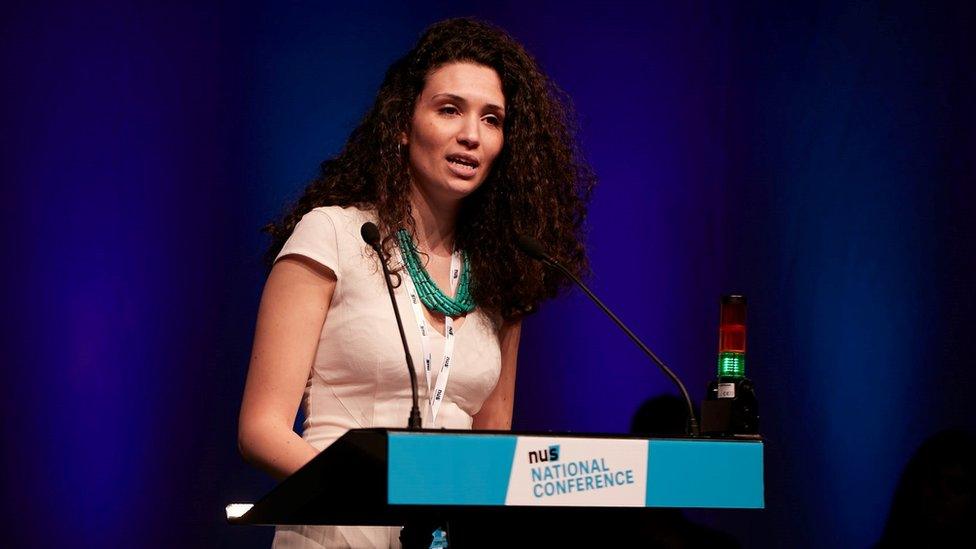National Union of Students elects Malia Bouattia as president
- Published

The National Union of Students has elected its first black Muslim woman president, Malia Bouattia.
But her previous comments have caused controversy and claims of anti-Semitism in student politics.
Ms Bouattia was the co-author of an article describing Birmingham University as "something of a Zionist outpost".
She has also been accused of not supporting a motion condemning the so-called Islamic State.
But the NUS says this was because she disputed the wording of the motion and not the principle.
Disputed language
"Some committee members felt that the wording of the motion being presented would unfairly demonise all Muslims rather than solely the group of people it set out to rightfully condemn," said an NUS spokeswoman about the vote in 2014.
The NUS says a subsequent motion condemned "the politics and methods of ISIS" and that this re-worded policy was supported by Ms Bouattia.
"NUS does not support ISIS and has always condemned violent terrorism," said a union spokeswoman.
The newly-elected NUS leader has promised to put "liberation at the heart of our work".
"From cuts to maintenance grants, college closures, the black attainment gap and the Prevent agenda, the number of voices and groups being silenced by this government grows by day."
Ms Bouattia's campaigns have included "Why Is My Curriculum White?" and she has opposed the government's Prevent counter-extremism strategy.
In 2011, she co-wrote a blog for a Friends of Palestine campaign group saying that "the University of Birmingham is something of a Zionist outpost in British Higher Education", external.
The group also publicised that they were "re-enacting an Israeli checkpoint outside the university's main library".
In a 2014 video from a Gaza and Palestinian Revolution event she questioned the value of the Middle East peace talks and warned of the influence of "mainstream Zionist-led media outlets".
Student walk-out?
BBC Newsnight has found that the election of the new president has raised questions about whether some student unions could face calls to leave the NUS, including both Oxford and Cambridge universities.
"Cambridge students should be given a chance to decide whether or not to remain part of the increasingly toxic culture and management of the NUS. Our students' union should represent what we want," said student Jack May.
But Wes Streeting, a Labour MP and former NUS president, said: "This is not the time to walk away."
"Students have never needed a strong, credible national voice more than they do now and moderate, mainstream students need to reclaim control of NUS," he told Newsnight.
The Labour MP had earlier tweeted: "NUS is lost I'm afraid." He said "it no longer represents students well".
Last week Ms Bouattia responded to an open letter signed by university Jewish society leaders, rejecting claims of prejudice.
"It seems I have been misrepresented. I am extremely uncomfortable with insinuations of anti-Semitism.
"I want to be clear that for me to take issue with Zionist politics is not me taking issue with being Jewish.
"In fact, Zionist politics are held by people from a variety of different faiths, as are anti-Zionist politics.
"It is a political argument, not one of faith," she said.
But Labour MP John Mann, and chair of the All-Party Parliamentary Group Against Anti-Semitism, said the NUS "is not doing enough to combat anti-Jewish hatred, and as such is failing in its responsibilities to its members".